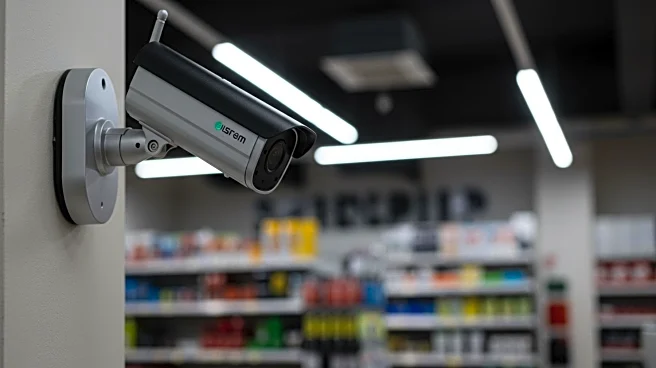What's Happening?
Home Depot is facing a proposed class action lawsuit filed by Benjamin Jankowski, a frequent shopper, who claims the company has been secretly using facial recognition technology at self-checkout kiosks. Jankowski alleges that the technology scans and collects customers' facial details without their consent, violating the Illinois Biometric Information Privacy Act (BIPA). The lawsuit states that Home Depot expanded its 'computer vision' technology in 2024 to reduce theft, capturing shoppers' facial geometry and storing it without informing them or obtaining written consent. Jankowski noticed the facial recognition system during a visit to a Chicago Home Depot, where a green box appeared around his face on the checkout screen, indicating the system was recording his facial features. He claims there were no signs or warnings about the facial scanning, and self-checkout was the only available option as no cashiers were present.
Why It's Important?
The lawsuit against Home Depot highlights significant privacy concerns regarding the use of biometric technologies in retail settings. If the allegations are proven, it could lead to substantial financial penalties for Home Depot under BIPA, which mandates transparency and consent for biometric data collection. This case underscores the growing scrutiny of facial recognition technologies and their implications for consumer privacy rights. Retailers and other businesses using similar technologies may face increased pressure to ensure compliance with privacy laws, potentially affecting their operational practices and customer relations. The outcome of this lawsuit could set a precedent for how biometric data is handled in the retail industry, influencing future regulations and consumer protection measures.
What's Next?
The lawsuit seeks to represent other shoppers who claim their facial data was scanned without consent at Home Depot's Illinois locations. Jankowski is asking the court to award $1,000 per negligent violation and $5,000 per willful violation of BIPA. As the case progresses, Home Depot may need to review and possibly revise its biometric data policies to address privacy concerns and legal compliance. The retail industry and privacy advocates will likely monitor the case closely, as its resolution could impact the use of facial recognition technology in stores nationwide. Additionally, other companies may reevaluate their use of biometric technologies to avoid similar legal challenges.
Beyond the Headlines
The lawsuit against Home Depot raises broader ethical questions about the balance between technological advancements and consumer privacy. As facial recognition technology becomes more prevalent, businesses must navigate the ethical implications of surveillance and data collection. This case may prompt discussions on the need for clearer regulations and guidelines to protect consumer privacy while allowing technological innovation. The potential for misuse and the risk of false positives in facial recognition systems also highlight the importance of developing robust safeguards and accountability measures.










